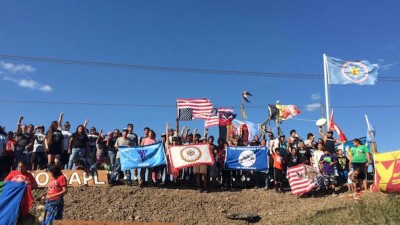Major Security Multinational (G4SP) Guards the Dakota Pipeline Where Native American Protesters Get Attacked

G4S, a U.K.-based security multinational, admitted to having personnel deployed at “remote sites” where Native Americans are defending their lands from the planned US$3.8-million Dakota Access pipeline that they say would pollute the drinking water of millions.
The actions have brought together over 200 tribes in solidarity and faced a heavy offensive by private security companies and state officers deployed under a state of emergency.
The security company has been under fire for providing services to Israeli prisons and settlements, expanding across the Middle East including Afghanistan and Iraq and operating juvenile detention centers and handling deportations from the U.S.
In an email to teleSUR, G4S Communications Director Monica Lewman-Garcia wrote, “G4S Secure Solutions is providing fewer than 10 security officers, assigned to remote sites, providing limited short-term unarmed patrol services.”
G4S recently published a new job opening for an armed custom protection security officer in Mandan, North Dakota—next to the campsites—which was reposted on Facebook by Lakota Sioux Tribe member Olowaan Plain.
Lewman-Garcia said that “there are other names” of security companies but failed to name any others. She would not answer other questions and was not available to speak by phone.
Organizers told teleSUR that 10-Code LLC, a local veteran-run company, is also providing security, but they were not able to be reached.
A direct action to stop construction on Saturday ended in security deploying dogs, who bit six people including a pregnant woman and a child. The private security forces also maced 30 people, activists said. G4S officers “were not present and not involved at the location where the incident occurred,” wrote Lewman-Garcia.
The Standing Rock Sioux Tribe, which set up the Sacred Stone Camp in April, was denied a request for a temporary restraining order against the companies behind the pipeline Tuesday. It filed the request after construction workers bulldozed “burial sites, prayer sites and culturally significant artifacts,” said tribal chairman David Archambault II in a press statement.
Over 200 tribes and First Nations and over 100 organizations and businesses, including an Ohio mosque, have signed statements of solidarity with the protests, which are said to be the largest Native American mobilization in almost 150 years.
The state has mobilized armed patrols and requested the help of federal officials following an emergency declaration and a state of emergency, justified by claims of “hundreds of criminal acts” and “outside agitators,” according to North Dakota Governor Jack Dalrymple—a claim that protesters deny.
The state homeland security director also pulled out state-owned water and medical services to punish “unlawful” protesters and ensure “equipment is secure.”
The FBI has also been sent to investigate “laser strikes” against a surveillance aircraft circling the camp. Morton County Sheriff Kyle Kirchmeier said the planes were there to ensure public safety, but people at the site said they were used to disrupt cell phone signals. Occupiers also complained about limited freedom of movement, with armed military checkpoints restricting entrance to the camps.
Meanwhile, the Red Warrior Camp has been continuing its direct actions at construction sites, which led the Army Corps of Engineers to support Tuesday’s temporary halt to some construction work on the basis of “ensuring peace.”
Two week-long solidarity protests have started across the country, targeting other companies benefiting from the pipeline, like Citibank and TD Securities.

